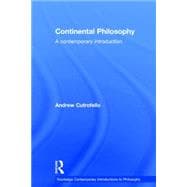
Note: Supplemental materials are not guaranteed with Rental or Used book purchases.
Purchase Benefits
What is included with this book?
| List of abbreviations | viii | ||||
| Preface and acknowledgments | xiv | ||||
| Introduction: what is continental philosophy? | |||||
|
1 | (4) | |||
|
5 | (9) | |||
|
14 | (3) | |||
|
17 | (3) | |||
|
20 | (3) | |||
|
23 | (6) | |||
|
29 | (1) | |||
| 1 The problem of the relationship between receptivity and spontaneity: how is truth disclosed aesthetically? | 30 | (81) | |||
|
31 | (1) | |||
|
32 | (2) | |||
|
34 | (6) | |||
|
40 | (8) | |||
|
48 | (10) | |||
|
58 | (6) | |||
|
64 | (7) | |||
|
71 | (9) | |||
|
80 | (8) | |||
|
88 | (10) | |||
|
98 | (11) | |||
|
109 | (2) | |||
| 2 The problem of the relationship between heteronomy and autonomy: to what does the feeling of respect attest? | 111 | (102) | |||
|
112 | (7) | |||
|
119 | (3) | |||
|
122 | (12) | |||
|
134 | (8) | |||
|
142 | (9) | |||
|
151 | (7) | |||
|
158 | (9) | |||
|
167 | (11) | |||
|
178 | (10) | |||
|
188 | (8) | |||
|
196 | (6) | |||
|
202 | (9) | |||
|
211 | (2) | |||
| 3 The problem of the relationship between immanence and transcendence: must we despair or may we still hope? | 213 | (122) | |||
|
214 | (11) | |||
|
225 | (9) | |||
|
234 | (10) | |||
|
244 | (4) | |||
|
248 | (11) | |||
|
259 | (9) | |||
|
268 | (7) | |||
|
275 | (9) | |||
|
284 | (9) | |||
|
293 | (10) | |||
|
303 | (8) | |||
|
311 | (10) | |||
|
321 | (11) | |||
|
332 | (3) | |||
| 4 The problem of the relationship between the empirical and the transcendental: what is the meaning of philosophical humanism? | 335 | (61) | |||
|
336 | (8) | |||
|
344 | (6) | |||
|
350 | (5) | |||
|
355 | (3) | |||
|
358 | (10) | |||
|
368 | (7) | |||
|
375 | (4) | |||
|
379 | (5) | |||
|
384 | (6) | |||
|
390 | (3) | |||
|
393 | (3) | |||
| 5 Conclusion: what is philosophy? | 396 | (23) | |||
|
396 | (6) | |||
|
402 | (15) | |||
|
417 | (2) | |||
| References | 419 | (14) | |||
| Index | 433 |
The New copy of this book will include any supplemental materials advertised. Please check the title of the book to determine if it should include any access cards, study guides, lab manuals, CDs, etc.
The Used, Rental and eBook copies of this book are not guaranteed to include any supplemental materials. Typically, only the book itself is included. This is true even if the title states it includes any access cards, study guides, lab manuals, CDs, etc.